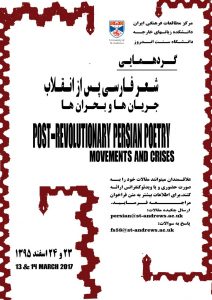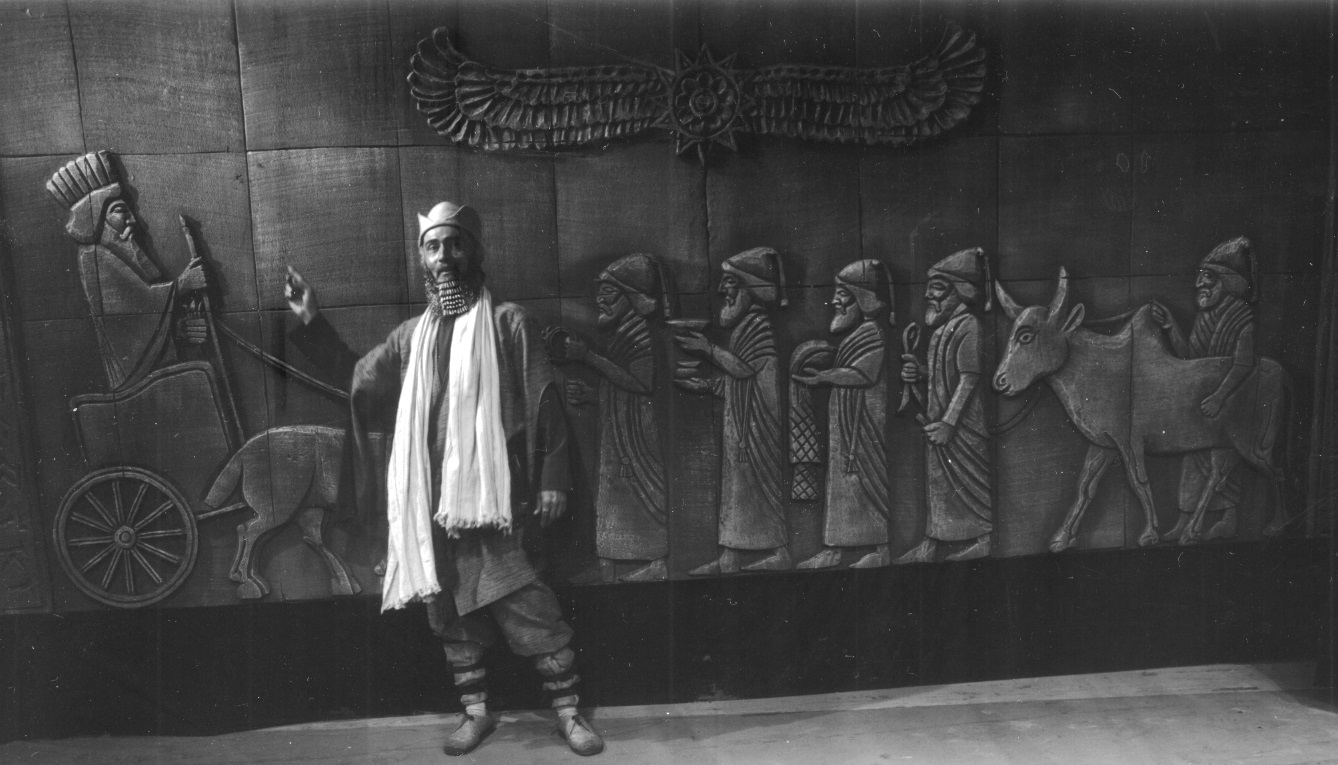 Post-revolutionary Persian Poetry: Movements and Crises
Post-revolutionary Persian Poetry: Movements and Crises
A Symposium Organized by the Forum for the Cultural Studies of Iran,
13-14 March 2017
School of Modern Languages, University of St Andrews
A survey of the published material and conference papers on Persian literature in English speaking countries suggests that there is a relative absence of research and information about post-revolutionary Persian Poetry in Iran, especially the poetry of the last two decades. This problem exists at two levels of quantity and quality. This is basically because even among the few people who research and write on Persian poetry, there is a tendency to avoid the work of some very influential poets and poetic movements of this period. This can be explained in terms of access and taste. Many of the scholars outside Iran may only have access to the works of mainstream modern poets and movements, and in the absence of independent public and academic debates on contemporary poetry inside Iran it becomes impossible for them to follow and identify good poetry. This is aggravated by the problem of taste which is very important in one’s ability to engage with poetry. If one’s taste is shaped by exposure to mainstream poetry, it becomes difficult to recognize the merits of evolving marginal forms even those with great influence on contemporary poetry. As a result, it is inevitable that scholars outside Iran may only like or engage with those contemporary poets whose styles echo the styles of the great modernist poets of the 1960s and 1970s. Considering that due to current limitations, the works of these poets and movements are also not studied at academic levels inside Iran, this lack of attention has created a major gap in the field, which can only be resolved if these poetic movements are given a voice and an academic space outside Iran.
Thus as the members of the Forum for the Cultural Studies of Iran, we have decided to organize a symposium about the Movements and Crises of Contemporary Persian Poetry (1979- 2017). Nevertheless, having considered the difficulties of obtaining visas from the British embassy in Iran we have decided to have some of the papers through video recordings and video conferencing. Thus apart from those who attend the symposium in person there will be space for at least 10 poets or scholars who will send a video of their presentations a few days before the symposium and then answer questions or join the discussion through video conferencing. This approach will also enable us to create a database that will be available to scholars interested in Modern and Postmodern Persian poetry.
The symposium which is entitled ‘Post-Revolutionary Persian Poetry: Movements and Crises’ will be held on 13 and 14 March 2017 and will contain papers in English and in Persian. Scholars and poets interested in the symposium must send abstracts of no more than 250 words to Dr Saeed Talajooy ([email protected]) by 9th January 2017. Each speaker will be given 20 minutes to present his or her paper. A selection of papers will be published in two special issues of a peer-reviewed journal on Contemporary Persian Poetry. The essays selected for the purpose must be between 6000 to 8000 words and must be prepared before 21 September 2017.
The list below includes some of the subjects that can be examined in the presentations, but we will welcome all specific studies aimed at examining important aspects of contemporary Persian poetry:
- Stylistics of Persian poetry in the 1980s, 1990s, 2000s and 2010s with case studies of well-known poets of each decade.
- The most influential poetic or critical works on poetry after the revolution.
- The relationship between poetry and politics after the revolution.
- Conditions of criticism and poetry translation after the revolution.
- Poetry and intermedia performances.
- The classical, modern, and post-modern Persian poetry.
- Canon-formation: awards, universities and the selection of masters and masterpieces of Persian poetry.
- Teaching and researching Modern Persian Poetry in Iran.
- The future of Modern Persian Poetry.
- Literary groups and the contraction and privatisation of the public space of poetry
- The Crisis of Readership in the last two decades.
- War poetry and anti-war poetry.
- Poetry from Provinces.
- The Perils of Publication and Underground Persian Poetry
121 Buchanan Building
University of St Andrews
Union Street, St Andrews,
Fife, United Kingdom, KY16 9PH
Tel: +44 (0)1334-463563
Dr. Saeed Talajooy: [email protected] (ABSTRACTS)
Farshad Sonboldel: [email protected] (INQUIRIES)
